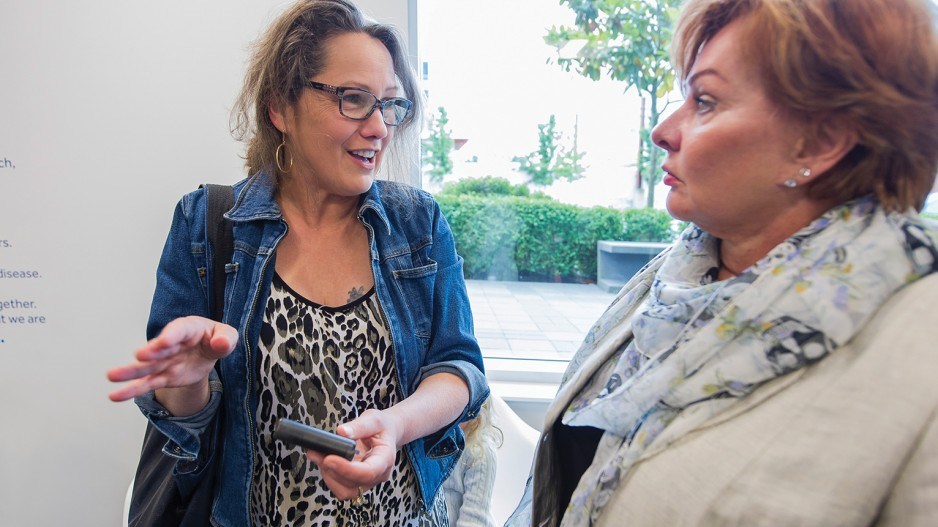The world’s biggest medical technology company has hand-picked Surrey for its first Canadian diabetes resource centre.
Medtronic Canada, a subsidiary of Medtronic (NYSE:MDT), has about 88,000 employees in 160 countries. It opened the centre mid-June and is seeing a number of patients from the local community. Located on the main floor of the City Centre 1 building at the Health and Technology District across from Surrey Memorial Hospital, it acts as an education and support network for local patients who rely on an insulin pump and continuous glucose monitoring technology for Type 1 or Type 2 diabetes.
According to Fraser Health, 38% of all known diabetics in British Columbia live in the heath-care authority’s jurisdiction. Fraser Health’s South Asian Health Institute notes research has shown people of South Asian descent are two to three times more likely to be diagnosed with heart disease, kidney disease, stroke and diabetes – and 10 years earlier – compared with other ethnic groups. There is also a higher prevalence among South Asian immigrants to Canada of people who are overweight, are older or have lower income levels, according to Diabetes Canada.
According to the Surrey Local Immigration Partnership, immigrants make up 40.5% of the city’s population, and 30% of immigrants speak Punjabi as the household’s first language.
Laura Cameron, director of Medtronic Canada’s diabetes group, said the company picked Surrey primarily because of its large and growing population base.
“There are certainly populations that have a higher risk of Type 2 diabetes, and that is one of the contributors to the higher prevalence within Fraser Health, … and that does include the South Asian community, and certainly we want to be there to support [them],” Cameron said. “We also want to provide them the chance to network from each other and learn from each other.”
According to Diabetes Canada, an estimated 29% of British Columbians – approximately 1.5 million people – have either diabetes or pre-diabetes, a proportion expected to increase to 32% or 1.9 million over the next decade. In the past 10 years, B.C. has had a 74% increase in those diagnosed with diabetes, and the number is expected to rise another 44% by 2027.
People with diabetes are at least three times more likely to be hospitalized with cardiovascular disease, 12 times more likely to be hospitalized with end-stage renal disease and over 20 times more likely to be hospitalized for a non-traumatic lower limb amputation compared with the general population.
In an emailed statement to Business in Vancouver, Sheila Kern, regional director for British Columbia and Yukon with Diabetes Canada, noted the disease costs the provincial health-care system $418 million every year. She added there are three key diabetes policy issues the organization wants addressed, including expanding the provincial insulin pump program to include all British Columbians with Type 1 diabetes who are medically eligible, regardless of age.
“Currently, this program is only available to individuals 25 years of age and under,” she wrote. “Those who do not qualify for the current program may need to spend $2,200 to $4,700 a year depending on their income – a high out-of-pocket expense that may hinder access to insulin pump therapy.”
Jodie Steen, a patient at Medtronic’s Surrey centre, has had Type 1 diabetes for 32 years. She started using an insulin pump 17 years ago. She said the pump has been life-changing.
“It has given me so much freedom and better blood sugar control than multiple daily injections.”
Steen, who recently attended the official opening of the centre in Surrey, said she is looking forward to having access to experts in insulin pump technology through Medtronic’s centre.
Arun Garg, medical director for Fraser Health’s South Asian Health Institute, said he has a simple message about diabetes for the South Asian population: while genetics do play a part, the biggest culprit is diet.
“The diet itself is not as balanced as it should be,” he said. “Especially between simple carbohydrates and all the other nutrients … the simplest thing I would tell them is cut out added sugar in their diet. So for me that was not adding sugar to my tea; it can be as simple as that.”
Medtronic, which has its headquarters in Dublin, Ireland, is valued at $110 billion according to Bloomberg Markets.




